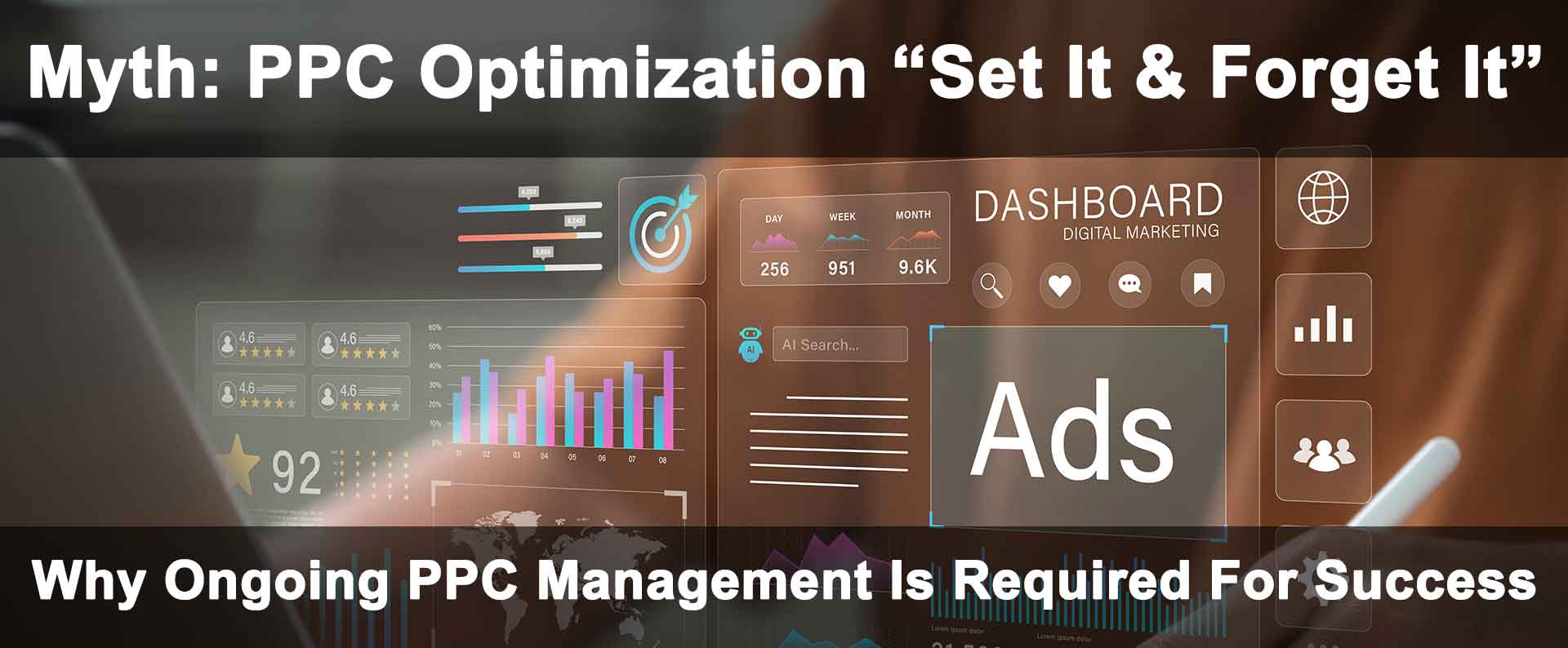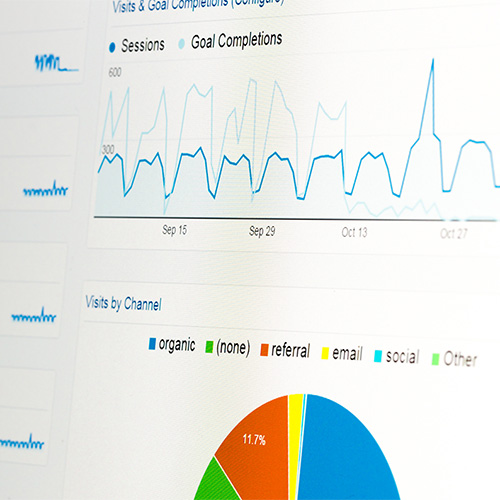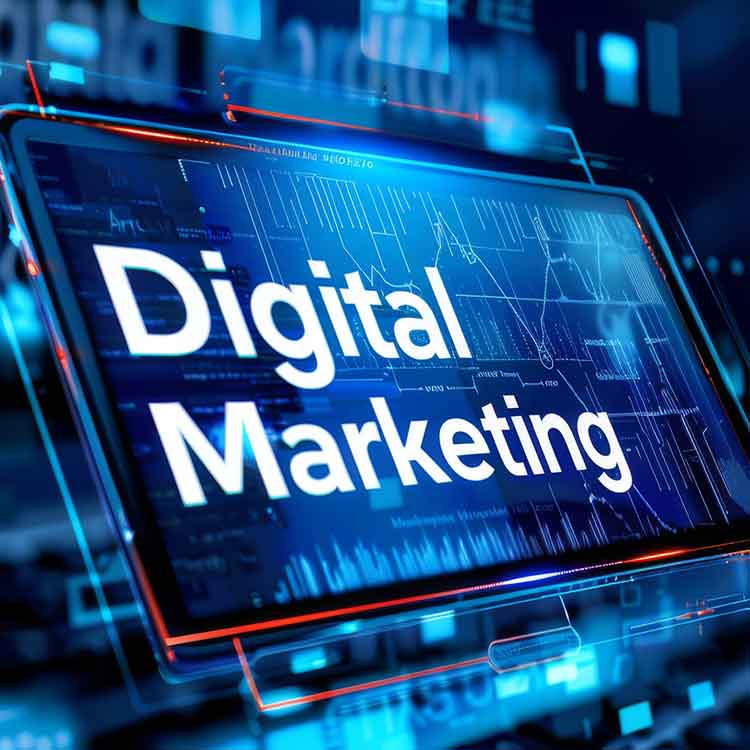Pay-per-click (PPC) advertising is a powerful tool for small and medium businesses (SMBs) to reach customers. But launching a PPC campaign, whether Google Ads, Microsoft Ads, Facebook/Meta Ads, etc, is just the beginning.
Like tending a garden, they aren't "set it and forget it" and require regular care to thrive as the ad platforms, privacy rules, consumer behavior and competitors change constantly. Ongoing management turns ad spend into predictable leads, bookings and sales, reduces wasted spend, and improves return on ad dollars.
Let's explore why ongoing optimization is essential for sustained success—and how businesses in retail, restaurants, hospitality, construction, healthcare, and professional services can tailor their strategies for maximum impact.
Why "Set It & Forget It" Doesn't Work
Google processes over 8.5 billion searches daily, and the digital landscape shifts constantly. Here's why ongoing management matters:
1. Adapt to Market Changes
- Competitors continuously adjust their bids and strategies. Regular monitoring ensures your ads remain relevant and competitive.
- Consumer trends evolve. Refreshing keywords and ad copy keeps your messaging aligned with audience interests, which is essential for maximizing engagement.
2. Leverage Real-Time Data
- Continuous analysis of performance metrics—such as click-through rates (CTR), conversion rates, and cost per acquisition (CPA)—enables businesses to identify successful elements and areas needing improvement.
3. Maximize Budget Efficiency
- Continuous optimization ensures your budget targets high-converting keywords. A restaurant could reallocate funds from underperforming lunch ads to dinner promotions.
4. Stay Compliant & Relevant
- Industries like healthcare must update ads to reflect changing regulations, while others need fresh messaging to align with seasonal trends.
5. Algorithm Updates
- Google's algorithm undergoes hundreds of changes annually. Staying informed about these updates and adjusting your campaigns accordingly is vital for maintaining visibility.
6. Quality Score Improvement
- A higher Quality Score leads to lower costs and better ad positioning. Regular tweaks can keep your ads competitive and relevant.
Google's Advice: "Small, incremental optimizations based on data can significantly improve performance over time."
Industry-Specific Strategies & Actionable Steps
Tailor your PPC approach to your sector with these tactics:
1. Retail
Why It Matters: 76% of shoppers use online search before visiting a store.
Benefits:
- Real-time adjustments to reflect seasonal trends and promotions.
- Effectively manage inventory levels to maximize visibility.
Actionable Steps:
- Dynamic Remarketing: Use AI tools to automatically show ads for viewed products.
- Seasonal Adjustments: Boost bids for "back-to-school" or "holiday deals" 2–3 weeks before peak periods.
Example: A clothing retailer could use Google Trends to incorporate timely keywords and adjust ad messaging when a new fashion trend emerges, leading to increased online and in-store traffic.
2. Restaurants
Why It Matters: 60% of diners search for restaurants on mobile devices while on the go.
Benefits:
- Target local consumers effectively, especially during peak dining times.
- Use time-sensitive promotions to command consumer attention.
Actionable Steps:
- Local Service Ads: Highlight delivery or reservation options with clickable buttons.
- Time-Targeted Promotions: Run "Happy Hour" ads from 3–6 PM with a 20% discount.
Example: A local eatery may boost reservations by running location-based ads for weekend brunch specials during a popular food festival.
3. Hospitality
Why It Matters: 53% of travelers book trips within a week of searching.
Benefits:
- Capture last-minute bookings and leverage seasonal events.
- Highlight unique amenities based on visitor preferences.
Actionable Steps:
- Hotel Price Extensions: Display real-time rates and availability directly in ads.
- Event-Based Targeting: Increase bids during local festivals or conferences.
Example: A boutique hotel could optimize its PPC campaigns to promote family-friendly packages during school holidays, ensuring more visible and relevant ad placements.
4. Construction
Why It Matters: 80% of homeowners search for contractors online.
Benefits:
- Reach appropriate audiences during relevant project phases.
- Enhance credibility with detailed service offers.
Actionable Steps:
- Call-Only Ads: Use "Emergency Roof Repair [City]" headlines for urgent inquiries.
- Project Portfolio Ads: Showcase recent projects with before/after images.
Example: A remodeling company might showcase recent project highlights in its ad creatives, using localized language to boost trust and attract neighborhood clients during peak renovation seasons.
5. Healthcare
Why It Matters: 77% of patients use search engines before booking appointments.
Benefits:
- Reach patients effectively with targeted healthcare services.
- Maintain compliance with industry regulations.
Actionable Steps:
- Telehealth Keywords: Target terms like "virtual doctor visits" or "online prescriptions."
- Compliance Checks: Update disclaimers (e.g., "Results may vary") to meet regulations.
Example: A dental clinic could increase appointments by optimizing its ads around seasonal services such as teeth whitening during summer, ensuring all messaging aligns with industry regulations.
6. Professional Services (Legal, Accounting, etc.)
Why It Matters: 65% of clients choose firms with strong online credibility.
Benefits:
- Establish authority and target potential clients actively seeking help.
- Adapt messaging based on regulatory timelines and common inquiries.
Actionable Steps:
- FAQ Ads: Answer common queries like "How to choose a tax attorney" in ad copy.
- Client Testimonials: Highlight star ratings or case results.
Example: An accounting firm could optimize its ads during tax season by featuring client testimonials and real-time updates that address current tax regulations, resulting in increased client inquiries.
Keeping Your Campaigns Ahead of the Curve
Embrace New Strategies
- Voice Search Optimization:
Target conversational phrases like "best HVAC repair near me" is essential for voice search like Siri, Alexa, etc.
- Visual Search:
Retailers can use Google Lens integration to target shoppers searching via images.
- Video Ads:
Use short clips in Google Discovery Ads to showcase restaurant dishes or hotel amenities.
- AI-Powered Bidding:
Tools like Google's Smart Bidding adjust bids in real-time based on conversion data.
Simple Monthly Optimization Checklist
- Weekly:
Review search terms reports to add new keywords and exclude irrelevant ones.
- Monthly:
Test ad variations (e.g., headlines, CTAs) using A/B testing, and update landing pages to match ad messaging (e.g., link a "Free Consultation" ad to a booking form).
- Quarterly:
Audit competitor strategies and adjust bids.
- Always:
Monitor Google's updates and adjust bids for high-performing keywords or seasons.
Universal Checklist
- Responsive Search Ads:
Allowing platforms like Google to optimize your creative variations automatically.
-
Conversion Tracking Enhancements:
Ensuring you capture more granular data to inform future adjustments.
-
Geo-Targeting & Dayparting:
Particularly useful for industries such as restaurants and hospitality where time and location dramatically affect performance.
-
Staying Informed:
Digital marketing platforms continuously evolve. Keep up with industry news, platform updates, and best practices by:- Subscribing to reputable sources such as Search Engine Journal or Google Ads' own resources.
- Participating in webinars or local digital marketing groups to exchange ideas.
Conclusion: Turn PPC into a Growth Engine
PPC campaigns are living strategies that thrive with attention. By embracing an ongoing approach to optimization, businesses in every industry can unlock the full potential of their advertising investment and stay ahead of the competition.
Whether you're in retail, hospitality, healthcare, or professional services, regular reviews, data-driven adjustments, and creative experimentation will help your Google Ads campaigns remain relevant, efficient, and effective.
Remember: Success isn't about perfection—it's about progress. Start small, track results, and iterate. Your future self (and your bottom line) will thank you.













